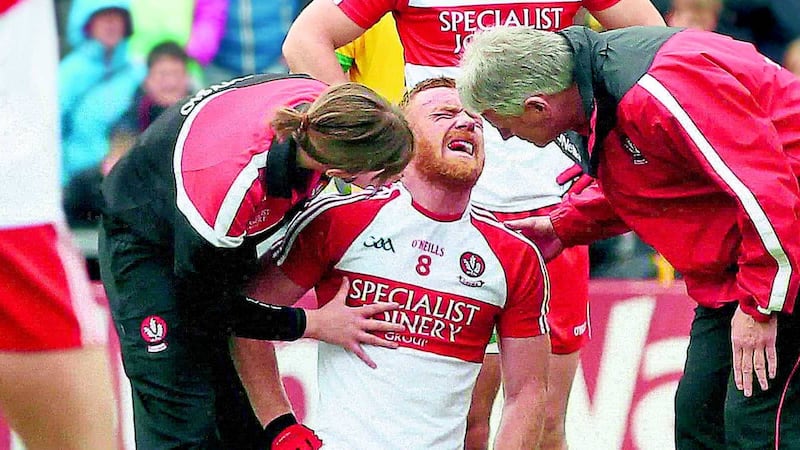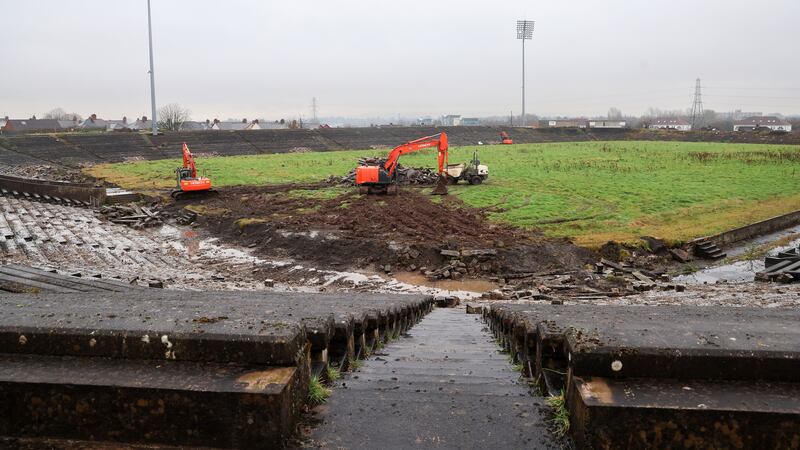"The tackle is a skill by which one or more players may dispossess an opponent or frustrate his objective within the rules of fair play. A tackle is aimed at the ball, not the player. A tackler may use his body to confront the opponent, but deliberate bodily contact such as punching, slapping, arm-holding, pushing, tripping, jersey pulling or a full frontal charge is forbidden.
- 'The Tackle' as it is defined in the 2014 edition of the
GAA's rule-book
ANYONE who wants to enjoy a mind-altering experience but who doesn't want to take hard drugs should take the following two steps: Step One: Read the rules of gaelic football.
Step Two : Watch a game of gaelic football.
Trust me, the contrasts, contradictions and inconsistencies will truly blow your mind.
Due to the media's total obsession with the black card, the major failing of the referees in the Ulster Championship has been completely overlooked.
After just three games, the interpretation of the rules concerning the tackle has been nothing short of appalling.
And unless our match officials sharpen up their act, their failure to punish illegal tackles is going to seriously dilute the entertainment value of this year's Championship. On Sunday, Donegal delivered a defensive masterclass. By flooding their defence with several banks of defensive lines, they presented a huge obstacle to Derry. Unwilling to kick the ball into a packed full-back line, the oak Leafers tried to prise openings by moving the ball to the wings and attacking Donegal from the areas where the Tir Chonaill men were happy to concede space. On the few occasions a Derry player tried to run at Donegal through the middle they were quickly swamped by a two- and three-man tackle.
In the central channels which Donegal wanted to protect, they made sure no Derry player gained any headway.
It needs to be stressed that Donegal's system was utterly superb and it once again showcased Jim McGuinness's abilities as a coach.
However, it also needs to be highlighted that referee Joe McQuillan granted far too much leeway to defenders as he repeatedly ignored blatant fouls. For starters, consider the three tackles made on Fergal Doherty which led to the injury which forced him to retire.
After taking a clean catch at midfield, Doherty started to make a run. Christy Toye made the first tackle. Toye tried to halt Doherty by slapping him on the chest.
At this stage, it's worth remembering the exact rule. "A tackle is aimed at the ball not the player".
Toye's hand wasn't anywhere near the ball. The next player who tried to delay Doherty's progress was Leo McLoone. McLoone grabbed Doherty around the waist. His challenge forced the Derry midfielder to fall. McLoone's challenge wasn't aimed at the ball either. When Doherty fell he picked up an accidental injury when odhrán Macniallais kicked the ball from his grasp.
If McQuillan had applied the rules he would have awarded Doherty a free-kick before he hit the deck. Apart from Derry losing the services of one of the best players on the park, McQuillan's decisionmaking had another impact on the game. Due to the latitude the referee provided defenders, Derry stopped trying to run at Donegal's defence.
In coaching circles, players are now routinely instructed not to carry the ball into the tackle. But why?
This advice is at odds with Colm o'Rourke's theory that the art of defending and man-to-man marking has gone out of the game. If defenders can no longer win their own battles, why are forwards being coached to off-load the ball before they meet an opponent?
The reason this trend has developed is largely because referees are allowing defenders to commit blue murder.
Based on the evidence of the first few games, the best referees in the country do not understand what constitutes a fair tackle.
While the new definition of the tackle permits two or three players to swarm an opponent, referees seems to have the impression that defenders are also allowed to commit common assault on the ball-holder.
David Coldrick was culpable of this error when he refereed the drawn game between Tyrone and Down.
In the eighth minute, Mark Poland took possession of the ball and fell after he was challenged by Aidan McCrory. While Poland was on the ground, McCrory was joined by Mark Donnelly.
The Tyrone pair kept Poland pinned to the deck. While neither Tyrone man made any attempt to dislodge the ball from Poland's grasp, Coldrick penalised Poland for over-carrying.
Two minutes beforehand, Coldrick ignored a blatant foul on niall Madine who was impeded in a similar manner by Danny McBride.
When managers advise players not to take on their men, what they are really saying is: 'Don't carry the ball into tackle because if you are stopped, you will be surrounded. And if you are surrounded you will slapped, punched and held - and the referee will penalise you for over-carrying.'
Due to the effectiveness of the blanket defence, it is going to remain a popular tactic in Gaelic football.
That prospect is not a problem.
In soccer, they have been parking buses in defences for years.
The bigger concern facing Gaelic football is what will happen when players aren't granted the protection of the rule-book.
If attacking players aren't prepared to take a risk and solo-run at defences, we are going to be subjected to a succession of lateral hand-passes.
And the gaelic football version of Tiki-taka is not an enjoyable spectacle. In fact, it's downright boring.
Teams are perfectly entitled to set up a blanket defence. But if a manager decides that he wants his players to run the ball and break tackles, then they should be afforded the full protection of the rules.
Judging by the decisions made in omagh and Celtic Park, that basic entitlement has not been forthcoming.
In other field sports like soccer and rugby, the rules are designed and implemented to reward positive, attacking play.
With the introduction of the black card, the GAA has tried to follow this philosophy.
The rules are being rewritten to favour adventure. But our referees are not implementing the rules as they are outlined in the GAA's official Guide.
It is still a defender's game - and anyone who doubts this opinion is urged to follow steps one and two.


